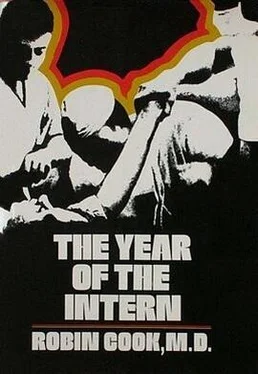The first suggestion of trouble was the hiccups, which had started about three days after the operation. Coming regularly every eighteen seconds, they were amusing at first. In fact, Roso became a hospital curiosity with his funny, clockwork hiccups. He was only fifty-five, but years in the pineapple fields made him look much older, all stooped and skinny; his pants kept falling off as he plodded through the ward pushing his IV stand. He, too, had run out of arm veins for his IV’s and, like Marsha, had a catheter in his right groin. This caused even more trouble. If he tightened the drawstring enough to keep his pants on, his IV stopped. So he had to walk with one hand on the IV pole, the other holding up his pants.
Roso was Filipino, and his English vocabulary was limited to fifty or sixty trenchant words, which he used to convey emotional concepts. “Body no more strong,” he would say, and it sufficed, like haiku poetry. I understood him and liked him very much. There was something tremendously noble and courageous about the man. Moreover, I think he liked me, which I realized later was an important part of my effort to keep him alive. When he saw me on morning rounds, Roso would smile broadly despite his hiccups, which made his whole body jump. Anyone could see that he was exhausted. I had tried every remedy I could find in surgical, medical, and pharmacological books, even folk medicine — breathing into a paper bag did not help him. In a more scientific vein, I had had him inhale a jug of 5-per-cent carbon dioxide, with no effect. Amyl nitrite and small doses of Thorazine hadn’t worked, either, nor had calcium, which I tried in an attempt to correlate the hiccups with his general hypernervous state; his reflexes were so brisk that when I hit below his knee with my rubber hammer he’d flip his slipper off. My big mistake all along was in not considering the hiccups as symptoms of something deeper. I kept seeing them as an isolated problem, when in sad fact they were just a side effect of the smoldering catastrophe inside.
The next symptomatic hint had occurred when the resident ordered Roso’s stomach tube removed and fluids allowed by mouth. Within an hour his stomach blew up to twice its normal size, and he began to vomit. In no way could we have made him more miserable, what with the hiccups, the vomiting, and the lack of sleep; any one of them would have been enough to drive most people crazy, but valiant little Roso would still be there smiling every time I saw him. “Body no more strong,” he’d say, always the same words, but carrying a slightly different meaning each time, depending on how he said them. “Body more strong soon”; I began to use his vocabulary in that curious way you do when talking to someone who doesn’t speak very good English. You begin to think he’ll understand better if you make mistakes, too. During medical school, with Spanish-speaking patients, I’d catch myself saying, “Operation you need inside abdomen.” This made no sense, of course, because if the patient understood the words surely he’d understand them in the right order. Mainly we were trying to reach to these people, to connect.
So poor old Roso had been put on intravenous fluid accompanied by constant gastric suction through the tube that disappeared into his nose en route to his stomach. Racked by constant hiccups, he vomited every time we took the tube out, whether we fed him or not. Just a few days earlier the tube had gotten completely clogged up, so that nothing but food stood between Roso and death. When I irrigated the nose tube to relieve the clogging, out had come a glob of material that looked like coffee grounds. It was old blood. It was lucky that I liked balancing fluid and electrolytes, because several times a day I had to figure out how much sodium and chloride were in those fluids that came out of him and replace them, plus the usual maintenance. I even gave him magnesium, on the chance it might help, after I came across an article in the hospital library on magnesium depletion.
But Roso’s big problem was inside, beyond my touch. Like Marsha Potts, he was leaking at the anastomosis site, the connection between the small intestine and the stomach pouch, except that in Roso’s case the incision hadn’t broken down. It was just leaking steadily all inside him, blocking his stomach and causing the hiccups, keeping him on IV fluids, driving his weight down every day so that now it was no more than eighty pounds. Fighting hard against the weight loss, which also meant loss of strength, I found articles about protein solutions and high percentage glucose solutions and tried everything they suggested; still he lost weight, going from merely skinny to the skeletal appearance of clear starvation. And through all this hell he smiled and talked his haiku. I liked him. Moreover, he was my patient, and I’d see him any time he needed me.
“Roso, how you doing?” I asked, looking down at him now. What a sight he was lying there in the gloom, wearing nothing but pajama bottoms, with an IV sticking in his right groin and the tube hanging out his nose. Every eighteen seconds his body twitched with hiccups.
“Doktoor, no more strong, too weak already.” He managed that much without hiccuping. We had to do something. I had been plaguing the attending physician, the chief resident, everybody, but to no avail. Wait, they said. I knew we couldn’t wait. Roso still trusted me, but his will was wearing out. “Doktoor, I no wanna live no more—” hiccup “ —too much.” No one had ever said that to me, and it stopped me cold. Although I could understand how he felt, I wouldn’t admit to myself that he’d reached this point, because I had seen what happened to patients when they gave up fighting. They died, just drifted away. Something in the human spirit could hold everything together, even in the face of utter physiological collapse, until the spirit gave way and carried the body down with it. Sometimes the despair was so obvious you didn’t ask a patient for normal responses, but Roso had spoken it, and that made his case different. I told myself that he just wanted to let me know he was near to giving up but actually hadn’t yet.
He desperately needed sleep. Although I could give him that, it was a two-edged sword. Sparine, a potent tranquilizer, would knock him out, anesthetize even the hiccups. But with that tube down his throat he was in constant danger of pneumonia, especially if he was unconscious; without the tube he might vomit, and if he vomited while he was knocked out, he might aspirate.
The Demerol and the skinny old man upstairs still nagged me, too. His relatives had been splendid about everything, never sensing the doubt in me, taking my words at face value, not cringing at the autopsy request. What if I had told them that I only thought their father was dead? How could they know that the difference between life and death was sometimes not black and white, but gray and indistinct? Marsha Potts, for instance: was she alive or someplace in between? I guessed I could call her alive, because if she got better she’d be fine, maybe; on the other hand, she probably wouldn’t get better, and at least part of her brain might already be dead. Some of her liver must surely be gone, in order for her to have jaundice and liver flap; her kidneys, too. Again, it wasn’t black and white, any more than my decision about Roso and the Sparine. But Roso was in need of a rest, and I had an irresistible urge to do something. That must be a strong human drive, to do something — just as when somebody in a crowd faints, one bystander is sure to run for a glass of water and another always makes a pillow for the head. Both actions are ridiculous in medical terms, but people feel more comfortable to be doing something, even in a situation that calls for a type of action they are not equipped to give.
Читать дальше












